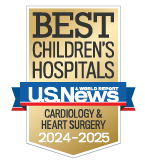Cardio-Oncology Program
Nationally ranked by U.S. News & World Report

Cardio-Oncology Program
Over the last several decades, cancer treatments have advanced significantly. This means much better survival rates for children with cancer. However, life-saving cancer treatments can still cause unwanted side effects to other organs, including the heart.
The medications’ harsh effects can cause cardiac (heart) issues known as conditions as cancer-treatment-related cardiotoxicity (CTC) — damage to the heart and vascular system.
CTC can happen during cancer treatment, but often the effects appear many years after treatment has finished. That’s why it is important to have a cardiac specialist involved in your child’s care — both during and after treatment.
Children’s Mercy specializes in cardio-oncology
Fortunately, Children’s Mercy’s experts have recognized the growing prevalence of this problem. As a result, we are one of only a few pediatric hospitals in the world to offer a dedicated cardio-oncology program. Our program offers specialized cardiovascular screenings by our pediatric cardiologists for kids who are in our cancer-treatment programs as well as afterward in our survivorship program.
Transformational Pediatrics podcast
Two of our experts, Aliessa Barnes, MD and Joy Fulbright, MD, discuss how they are helping make sure today’s cancer survivors are not tomorrow’s heart failure patients on the Transformational Pediatrics podcast.
Why is cardio-oncology important?
Research shows that the most common cancer treatments, radiation and chemotherapy—in particular, a type of chemotherapy medicines known as anthracyclines—can result in damage to the heart or vascular system. These heart problems include:
-
Heart failure (when the heart can't pump enough blood to meet the body’s needs)
-
Myocardial infarction (commonly known as a heart attack, when blood flow stops to a part of the heart causing damage to the heart muscle, potentially leading to heart failure, an irregular heartbeat or cardiac arrest)
-
Valvular heart disease (when one or more of the heart valves don't work well)
-
Pericarditis (a condition in which the membrane, or sac, around the heart is inflamed)
-
Left ventricular dysfunction/cardiomyopathy (where the heart muscle becomes enlarged, thick or rigid and can’t contract and relax normally)
-
Dyslipidemia (high cholesterol)
-
Hypertension (high blood pressure)
-
Vascular disease (an abnormal condition of blood vessels)
-
Arrhythmia (a problem with the heartbeat’s rate or rhythm)
-
Obesity (excess body fat)
Addressing potential cardiac concerns from the start of cancer therapy can help manage these possibilities, especially for children with pre-existing cardiovascular conditions.
Our approach to cardio-oncology treatment
Although most hospitals involve cardiology (heart specialists) as consultants when cancer patients have pre-existing cardiac issues, Children’s Mercy has a different approach. We have created a unique and special collaborative clinic to best coordinate the complex needs of all children facing cancer.
When your child is first evaluated, a pediatric cardiologist works alongside your child’s oncologist (cancer doctor) and other medical professionals to evaluate and manage your child’s heart health, from the initial cancer diagnosis through the treatment regimen and into remission. Your child’s health-care management includes:
-
Identifying cancer-related heart disease in its early stages
-
Minimizing cardiotoxic side-effects
-
Tracking disease using imaging techniques (such as CT scans or MRIs) or serum biomarkers (proteins in blood, urine or other body fluids that indicate the presence of cancer)
-
Initiating additional therapy as needed
Ultimately, the team’s collaborative efforts can improve the quality of care for your child.
What does long-term cardio-oncology treatment include?
Children’s Mercy’s Cardio-Oncology Program ensures that any child treated for cancer with chemotherapy or radiation will receive follow-up care that includes:
-
A baseline electrocardiogram (EKG) at the beginning of long-term follow-up (about two years after final treatment)
-
An echocardiogram at the beginning of long-term follow-up
-
An echocardiogram regularly during long-term follow-up as recommended by your child’s health care provider (based on your child’s age when treated, the total amount of anthracyclines received and whether your child received chest radiation)
-
Annual check-ups that pay special attention to the heart
-
Cardiac stress testing about five years after certain high-dose radiation treatments or radiation plus anthracycline treatments and regularly thereafter as recommended
